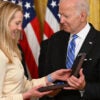There’s not been a lot of good news for, or about, the British armed forces recently. When the Economist asked, in its Jan. 29, 2009 issue, if the Army was losing its way, the story’s lead summed up their answer: “The British army suffers from lack of soldiers, lack of money and lack of conviction.” And that was putting an optimistic spin on things: in reality, the situation was a good deal worse than the Economist allowed.
There’s no reason to be happy about the recession. But you know what they say about an ill wind. The Telegraph reports that:
Thousands of potential recruits have been flocking to recruiting centres in the last few months as the country entered a recession and unemployment mounted.
These are recruits the Army needs desperately. It has to recruit about 12,000 troops a year, but in recent years has fallen about 3,200 short of this level. Almost all the Army’s battalions are under strength, and some are so shorthanded they are regarded as operationally ineffective. At 21,709 soldiers, the infantry is over 2,000 below strength.
It’s not likely that this recruiting surge, which is expected to yield only about 1,000 additional troops, will solve the problem. The recession will probably make a greater ‘contribution’ to the forces by encouraging those already enlisted to stay with the colors. Still, 1,000 more troops is a good deal better than no more.
But this flush of interest in the Army may be most valuable for another reason. We know remarkably little about who enlists in the British forces. Unlike the U.S, where the Heritage Foundation annually produces a study of “Who Serves in the U.S. Military?,” Britain releases no official information about the socio-economic background or educational attainment of its enlistees.
The information that does leak out is not encouraging. In the U.S., contrary to conventional wisdom, “Members of the all-volunteer military are significantly more likely to come from high-income neighborhoods than from low-income neighborhoods,” and only about 1% of enlistees do not have a high school diploma. In Britain, according to one source, “the average reading age of recruits, who join on average at the age of 18, was just 11.”
If the busy recruitment centers in Britain offer an opportunity for the forces to begin raising their standards, that would be all for the good. And if Britain took the opportunity to conduct a full review of recruiting and retention, and to release U.S.-quality data on its enlistees, that would be even better.


























